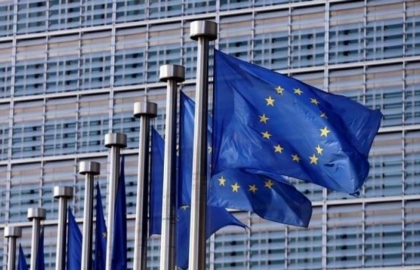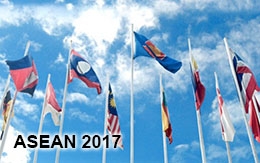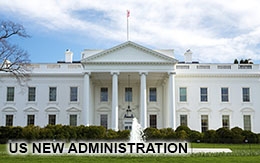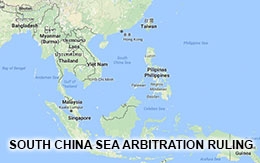The EU's interest and policy towards East Asia maritime security
The EU is better suited to pursue its interests East Asia through the promotion of multilateral ocean governance and concrete collaboration measures.

Strategically and economically, Northeast and Southeast Asia are important regions for the European Union (EU). China is the EU´s second largest, the Association of Southeast Asian Nations (ASEAN) its third largest trading partner. Conversely, the EU is for China the largest and for ASEAN the second largest trading partner as well as the main source of investments. Consequently, peace, regional stability, and freedom of navigation and overflight in the South and East China Seas – two globally vital Sea Lines of Communications (SLOC) – are of crucial importance for the EU and its member states alike. However, unlike the United States Brussels lacks military power projection capabilities to safeguard its interests. According to the former German diplomat Volker Stanzel, though, “A militarisation of the EU’s Asia policy is not feasible, and probably not desirable.”[1]
Despite lacking military power, the EU is a significant actor in global politics, due to its economic strength and its Common Foreign and Security Policy (CFSP). The CFSP is not based on supranationalism; instead it builds on intergovernmentalism, leading to a common, not a single policy. Accordingly, it requires unanimity, thus the concrete decisions and policies are often based on the lowest common denominator, as the national interests of the 28 EU members are still strong and sometimes conflict with those of other members or the European Commission. Overall, the influence of the High Representative for Foreign Affairs and Security Policy, Federica Mogherini, is in reality limited. The ongoing refugee and migration crisis is the most prominent example for political divisions among the EU-28, the Brexit another, illustrating the conflicts on the scope and degree of European integration.
The Brexit will reduce the international influence of both London and Brussels. Being a permanent member of the United Nations Security Council and a nuclear power, Britain is a strong contributor to global and European security. A soft Brexit, however, would increase the probability of a deep foreign policy and security collaboration with the EU. Such a scenario would be beneficial for both parties, as the relations of the EU with its core partner, the United States, are weakening since Donald Trump became US President in 2017.[2] However, whether Trump´s criticism on the North Atlantic Treaty Organisation (NATO), the key pillar of Europe´s defence, and multilateralism in general will facilitate a closer European foreign policy and security collaboration – and thus a stronger European role in global politics – remains to be seen.
The above-mentioned challenges for the EU are also reflected in the priorities of the Austrian EU Presidency (second half of 2018). The motto for the presidency – “A Europe that Protects” – implies a more inward-looking strategy for Europe. Geographically, Austria focuses on the European neighbourhood, notably the Western Balkans and Southeastern Europe. This is in line with the political orientation of the current Austrian coalition government, but also historically the Habsburg Empire never had strong geopolitical interests in East Asia. The Asia-Europe Meeting (ASEM) in Brussels on 18/19 October 2018 offered Vienna an opportunity to deepen its relations with East Asia, notably Vietnam and Singapore (the city-state holds the ASEAN Chair in 2018). The Prime Ministers Nguyễn Xuân Phúc and Lee Hsien Loong met Chancellor Sebastian Kurz in Vienna before flying to Brussels. At the ASEM summit the 51 member states agreed on increasing connectivity between Europe and Asia as well as strengthening the multilateral, rules-based international order. Not least this strong consensus can be regarded as criticism on Washington´s new unilateralism.[3]
The EU´s discourse on East Asian maritime securityThe EU´s influence in global politics builds on economic influence as well as being a good, multilaterally oriented international citizen and a reputed normative power. It also promotes good governance and regional cooperation in other continents. Brussels institutionalized relations with other regional groupings, inter alia, with Southeast Asia (e.g. ASEAN Regional Forum and ASEM). Concrete collaboration, though, is reduced to financial support, the sharing of good practice or assistance in capacity building and training.[4] In case an internal consensus is forged, the EU can also impose sanctions on nations that violate the international law. Currently it enforces sanctions against Russia after the annexation of Crimea. In lieu of a robust CFSP, the resolutions and declarations gain significance, as they can be regarded as the EU´s (declamatory) policies. Consequently, they form the base to scrutinize the EU´s discourse on maritime security in East Asia.
Similar to the United States, Japan or Australia, the EU is neutral in regard to the territorial claims in the South China Sea. Also in accordance with these nations, Brussels made it routinely clear in its policy papers that it sees no alternative to a peaceful settlement of the maritime disputes in accordance with international law, notably the United Nations Convention on the Law of the Sea (UNCLOS). Unlike the US, the EU and its 28 members are signatories of UNCLOS.
In its revised Maritime Security Strategy (EUMSS) of 2018 the EU stresses its role in “promoting maritime multilateralism and the rule of law at sea, the universal application of [UNCLOS]”, which is regarded as critical for maintaining a rules-based order at the seas. Another key principle is maritime multilateralism in ocean governance. Concerning the Asia-Pacific region and notably the South China Sea, the EU aims to “support the application of UNCLOS and the establishment of mechanisms for regional maritime confidence-building measures”. Also highlighted is support for ASEAN-led processes and mechanisms, e.g. the Regional Cooperation Agreement on Combating Piracy and Armed Robbery against Ships in Asia (ReCAAP).[5] Many EU declarations and resolutions are critical of China´s actions in the South China Sea, notably the building of artificial islands and the militarization of the sea.[6]
In line with these well-established principles and discourse, High Representative Mogherini stated in a declaration on the award of the Arbitrational Tribunal on the South China Sea arbitration on behalf of the 28 members the EU´s position on 15 July 2016. In contrast to the United States, Japan or Australia, the EU does not pressure China to respect the award which was strongly in favor of the Philippine´s legal position. The strongest reference to the ruling of the Arbitrational Tribunal statement, though, was made by the Group of Seven (G7) Foreign Ministers in April 2018. It identifies the award “as a useful basis for further efforts to peacefully resolve disputes in the South China Sea”. The four European members – France, Germany, Italy and the United Kingdom – supported this wording. Not surprisingly, also within the EU, France, Germany and the United Kingdom seemed to prefer a similar wording in the EU declaration. The French Minister of Defence Florence Parly, for instance, stated in June 2018 that “France fully supports a code of conduct in the South China Sea which should be legally binding, comprehensive, effective, and consistent with international law.”An indirect criticism on China in the EU declaration of July 2016 could be a sentence that stresses the “need” of the conflict parties “to clarify their claims and pursue them in respect and in accordance with international law, including the work in the framework of UNCLOS”. Remarkable, in her stronger statement from 11 March 2016 Mogherini said the countries shall pursue their claims “in accordance with international law including UNCLOS and its arbitration procedures”. The July 2016 statement only mentions that UNCLOS provides mechanisms that are “essential to settle disputes”. Mogherini further emphasizes that “The EU supports the swift conclusion of talks aiming at an effective Code of Conduct between ASEAN and China”. She fails to mention that this code should be legally binding for all parties. A similar wording is used in the revised European Maritime Security Strategy of 2018: The EU shall “encourage the swift conclusion of the talks on a code of conduct which will further support the rules-based regional and international order.”[7]
However, criticism on the EU´s avoidance of the term “legally binding” in reference to the Code of Conduct is not fully justified. The main reason is that even ASEAN does not use this term, instead also preferring “effective Code of Conduct”.[8] Also in regard to the emphasis on a rules-based maritime order the similarities between the ASEAN and EU resolutions are stark. Brussels is also opposed to unilateral actions that could alter the status quo, a wording that, for instance, Vietnam also uses regularly to criticize China. Strikingly, Beijing argues very similar to ASEAN and the EU on freedom of navigation, when it its national interests in the Arctic are affected:
Criticism on the EU, though, can be uttered on avoiding prompting Beijing to accept the award. This holds especially true, as the European Parliament issued a strong statement in December 2015. The Parliament, which in general takes a more critical and comprehensive view on the relations with China than the European Council and the European Commission, stressed in a strongly worded resolution in December 2015
“(…) the importance of peaceful settlement of disputes, based on international law and with the help of impartial international mediation such as the UN Convention on the Law of the Sea (UNCLOS); considers it regrettable that China refuses to acknowledge the jurisdiction of both UNCLOS and the Court of Arbitration; urges China to reconsider its stance and calls on all the parties including China to respect the eventual decision of UNCLOS (…)”.
Coincidentally, the award of the Arbitrational Tribunal was presented on the very day of a China-EU meeting in Beijing. Despite three days of discussions after the release, the 28 EU members failed to reach a consensus on criticizing China. Due to their own pending legal dispute settlement of overlapping maritime claims – the award of the Arbitral Tribunal (in favor of Slovenia) was eventually released on 29 June 2017 – Croatia and Slovenia were cautious not to set a pretext. More importantly, though, were Greece´s and Hungary´s support for China´s position. Both Athens and Budapest benefit from Chinese infrastructure investments, be it the Port of Piraeus or the planned high-speed railway connection Belgrade-Budapest. While Hungary is a member of 16+1, Greece has observer status; eleven participants are EU members. 16+1 is a cooperation format China created in 2012 as umbrella for its bi- and multilateral arrangements with 16 Central Eastern and Southeastern European nations. Since autumn 2013, this forum has been focused on the promotion of the Belt and Road Initiative (BRI).[9] At different instances, certain 16+1 members blocked EU decision that were critical of China – comparisons with Beijing´s instrumentalization of the economic dependency of Laos and Cambodia within ASEAN are not far fetched. The Commission already uttered skepticism on China`s inroads to Europe via the 16+1 mechanism. Brussels is concerned about losing its ability to speak with one voice.
Notwithstanding the EU´s increasing skeptical view of China, closer Sino-EU relations are a strong possibility, not least due to potentially positive economic impacts of BRI, but also due to Brussel´s and Beijing´s criticism of US President Donald Trump´s trade policies. Both are, at least verbally, keen to upheld the principles of multilateralism and free trade. International politics, though, as well as traditional partnerships are currently undergoing fundamental changes that make predictions about future coalitions difficult.Individual member states
As already mentioned, the EU´s power projection capabilities are in reality severely limited. Among the individual member states only France, Germany, Spain and the United Kingdom can contribute with significant troops and weaponry to international operations (usually via NATO). A military presence in the East China Sea and South China Sea, including Freedom of Navigation Operations (FONOPs), can only be upheld by France and the United Kingdom – both are permanent members of the UN Security Council and former Colonial powers that still have major strategic interests in East Asia. France has five territories in the Pacific, including New Caledonia and French Polynesia.In June 2016, then French Minister of Defence Jean-Yves Le Drian stated at the Shangri-la Dialogue in Singapore that France is willing to defend the principle of freedom of navigation, putting it “into practice, by sailing her ships and flying her aircraft wherever international law allows and operational needs require”. In fact, France conducted since 2014 such missions in the South China Sea. In May 2018 two French warships sailed through the Spratly Islands. A few days later the British Minister of Defence Gavin Williamson announced that London sends three military vessels to East Asia. Interestingly, he mentioned the deployment in the context of upholding the United Nations sanctions against North Korea. However, he also declared London´s commitment to protect freedom of navigation in the South China Sea. In August 2018 the HMS Albion, a British military vessel, sailed close to an artificial island built by China in the Paracel Islands. Expectedly, China condemned London´s “provocative actions”.
ConclusionThe EU will remain an interested party in ocean governance and maritime security in East Asia, cooperating both with ASEAN and China. However, in particular compared to actors such as Japan, India and Australia, let alone the United States, its role will remain weak. The main reason is that Brussel cannot build its influence on military capacities, but solely on economic, soft and, not least, declamatory power. As long as the situation in the East and South China Seas stay relatively calm, these instruments may be sufficient to promote the EU´s strategic interests and maritime governance principles.
Yet, in times of a severe crisis, the EU, lacking a credible military power projection potential, would not be able to pressure the conflict parties to reach a peaceful resolution. Without such a power base, a mediating role of the EU is not likely to be accepted in East Asia – neither by China, which is critical of the involvement of non-Asian actors, nor by ASEAN, as a stronger role of the EU would demonstrate ASEAN´s failure to promote a peaceful settlement in its own region. It would thus undermine the Association´s regional centrality. A military engagement, probably in support of the United States, can only be expected by individual EU members. Notably France and the United Kingdom can be considered as candidates to formally join an US-led FONOP to demonstrate China their political and military willingness to uphold freedom of navigation.
The EU is better suited to pursue its interests through the promotion of multilateral ocean governance and concrete collaboration measures, e.g. sharing of best practice and financial and technical support for confidence-building measures of the disputing parties in the East and South China Seas. 67 years ago, six European nations started an unparalleled cooperation and integration process with pooling sovereignty over the control of then crucial military resources (coal and steel). To strengthen the promotion of this neo-functionalist approach of cooperation in East Asia to resolve (territorial) disputes at sea may increase the EU´s influence in the region more than pure military might.
Mag.Dr. Alfred Gerstl, MIR is an Austrian specialist on International Relations in Southeast Asia, notably on regional cooperation and the South China Sea. He is currently a postdoc researcher at the Department of Asian Studies at Palacky University in Olomouc (Czech Republic), working in the European Regional Development Fund Project “Sinophone Borderlands – Interactions at the Edges” (CZ.02.1.01/0.0/0.0/16_019/0000791).
Click here for pdf file
[1] Volker Stanzel, "Danger on the High Seas: The East Asian Security Challenge," European Council on Foreign Relations, Policy Brief, No.156, 2016, pp. 1–12, here p. 9.
[2] Marianne Riddervold and Akasemi Newsome, "Transatlantic relations in times of uncertainty: crises and EU-US relations," Journal of European Integration, 2018, Vol. 40, No.5, pp. 505–521.
[3] See Council of Europe Website at https://www.consilium.europa.eu/de/meetings/international-summit/2018/10/18-19/, accessed October 25, 2018.
[4] See for instance ASEAN-EU Plan of Action (2018–2022).
[5] "Council conclusions on the revision of the European Union Maritime Security Strategy (EUMSS) Action Plan. 10494/18," Council of the European Union, June 26, 2018: 29.
[6] "Declaration by the High Representative on behalf of the EU on Recent Developments in the South China Sea," March 11, 2016, accessed October 25, 2018, http://www.consilium.europa.eu/en/press/press-releases/2016/03/11/hr-declaration-on-bealf-of-eu-recent-developments-south-china-sea/; and "Resolution of 16 December 2015 on EU-China relations (2015/2003(INI))," European Parliament, accessed October 25, 2018 https://eur-lex.europa.eu/legal-content/EN/TXT/PDF/?uri=CELEX:52015IP0458&from=EN.
[7] "Council conclusions on the revision of the European Union Maritime Security Strategy (EUMSS) Action Plan. 10494/18," Council of the European Union, June 26, 2018: 29.
[8] "ASEAN: Joint Communiqué of the 51st ASEAN Foreign Ministers´ Meeting," August 2, 2018, §74, accessed October 25, 2018, http://asean.org/wp-content/uploads/2018/08/51st-AMM-Joint-Communique-Final.pdf. Cf. Alfred Gerstl. “The South China Sea Dispute: A Shift to a more proactive Role in ASEAN´s declamatory Policy and concrete Policies since 2012?” in Unresolved Border, Land, and Maritime Disputes in Southeast Asia. Bi- and Multilateral Conflict Resolution Approaches and ASEAN's Centrality, edited by Alfred Gerstl and Mária Strašáková (Leiden and Boston: Brill, 2017), pp. 183–230.
[9] Gerstl, Alfred, "China´s New Silk Roads. Categorizing and Grouping the World: Beijing´s 16+1+X European Formula," Vienna Journal of East Asian Studies, 10 (in publication).










